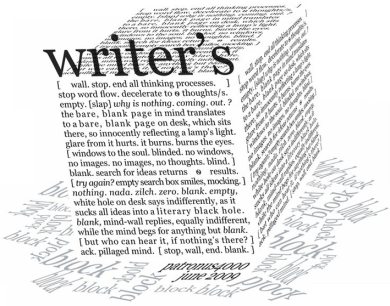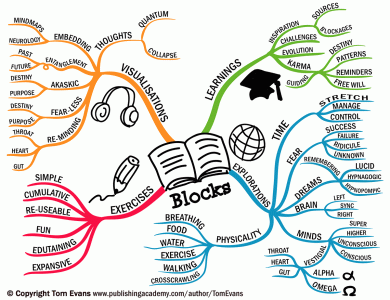Rose, Mike. “Rigid Rules, Inflexible Plans, and the Stifling of Language: A Cognitivist Analysis of Writer’s Block.” Trans. Array College Composition and Communication. 1980. 389-401. <http://advancedcomposition2009.wikispaces.com/file/view/Rose+Rigid.pdf >.
After reading and blogging about rigid rules and its effects of writer’s block, the issue and study examined in the article “Rigid Rules, Inflexible Plans, and the Stifling of Language…” further came to my attention. The purpose of the study shown is to compare writing blockers and non-blockers and their reasons behind the differences when it comes to their writing experiences. The article includes a study and personal experiences from the students to emphasize the conclusions of the effects of the rigid rules for writing assignments. Based on this article, I can relate to the information that has been stated and concluded.
 The author, Mike Rose, is a professor at University of California, Los Angeles with a background in English and counseling psychology. His background evidently inspired his study for rigid rules and the subtopic of writer’s block.
The author, Mike Rose, is a professor at University of California, Los Angeles with a background in English and counseling psychology. His background evidently inspired his study for rigid rules and the subtopic of writer’s block.
Rose starts off his study with ten students from UCLA: five students who undergo writer’s block because of the set rules assigned to them and their struggles with planning strategies, and another five students who do not struggle at all with the same given assignment (389). For his study, he analyzes the reasons for writer’s block and compares them to how the non-blockers do not go through the same issue as the ones who do. Along the lines of his analysis, he concludes that the effects of writer’s block is influenced by the rigid rules that students have to apply in their assigned essays. The obvious difference is shown to be that the non-blockers utilize minimal rigid methods, compared to the blockers, which enhanced their writing instead of affecting it negatively (Rose, 398). Although there may be other factors to writer’s block, Rose believes that one of the main reasons is the fixed rules that emphasizes the students’ mind over the actual assignment, which leads to the students’ misbalance of the contents of their writing.
Aside from the study he formed, Rose demonstrates how the procedure of writing can be compared to a problem-solving process. He breaks down the system to three stages: introductory period, processing period, and solution period (390). The period where the actual writer’s block hits is during the processing period due to the misuse of rules and plans. Rose further elaborated by defining two types of rules: Algorithms and Heuristics, and established that the blockers from his study mistaken rigid rules for algorithms (precise and constant answers) (398). Therefore, students, including myself, overthink their assignments and struggle to find a certain answer for their writing.
Writer’s block is personally my main issue when it comes to assigned essays, and that is why this particular article interested me the most. Procrastination has played a big part of this obstacle, but it has mainly been the rigid rules I had to apply to my writing that has gotten in the way. I have focused on trying to perfect my essay while incorporating all the rules set for the assignment; this then have led to not being able to balance everything that needs to be put on paper. Mike Rose concludes that blockers have imaged the rigid rules as restrictions and a process that must always be applied on their paper. Also, the blockers tend to have distracted themselves from their inappropriate planning processes, and merely did not ask anyone for feedback on their writing or clarification on the assignment during their writing process (Rose, 398-399). On the other hand, non-blockers have been able to apply the rules at necessary times, like when they need to change or ignore a part of their writing; they also have been more willing to adapt their plans to fit their assignment and ask for feedback and/ or clarification (Rose, 398-399).
After his study, the only solution to lessen students’ writer’s block is to consult instructors to examine their students’ work and progress in writing and their opinion towards the rules assigned to them (Rose 400). Rose believes that this will bring awareness to the teachers of which rules or plans may be unnecessary for the class. This will then leave room for those blockers to have space for their train of thought.
From Rose’s inferences, I definitely fall under the title of a blocked writer. Based on what I learn from his conclusions, I should not overwhelm myself with the many rigid rules I already know, because not all of them apply to every essay assigned to me. Therefore, using less rigid methods can adapt to my writing situations. Also, by asking peers or teachers for comments and advice to improve my writing will help me expand my mind flow and learn from past errors. Although, as valid and helpful Rose’s conclusion may be, there are plenty more long-term solutions for those who struggle with writer’s block. With that in mind, I have developed an arising thought for this topic: In what other ways can writer’s block be avoided or lessened— and which specific rigid rules trigger blockage of writers’ flow of thought?

Solid post. Nicely set up and good use of transitions! Keep up the good work.
This blog post is really good, I like how you added pictures to connect with your whole blog. Great transitions. Since we both share a similar thought for writer’s block, you should check mine out.. http://english11460fall2013molina.wordpress.com/2013/12/05/having-rigid-rules-can-lead-to-slowdowns-in-your-writing/
I love the picture! I used it too hahaha but lovely transitions and the hyperlinks were super helpful!